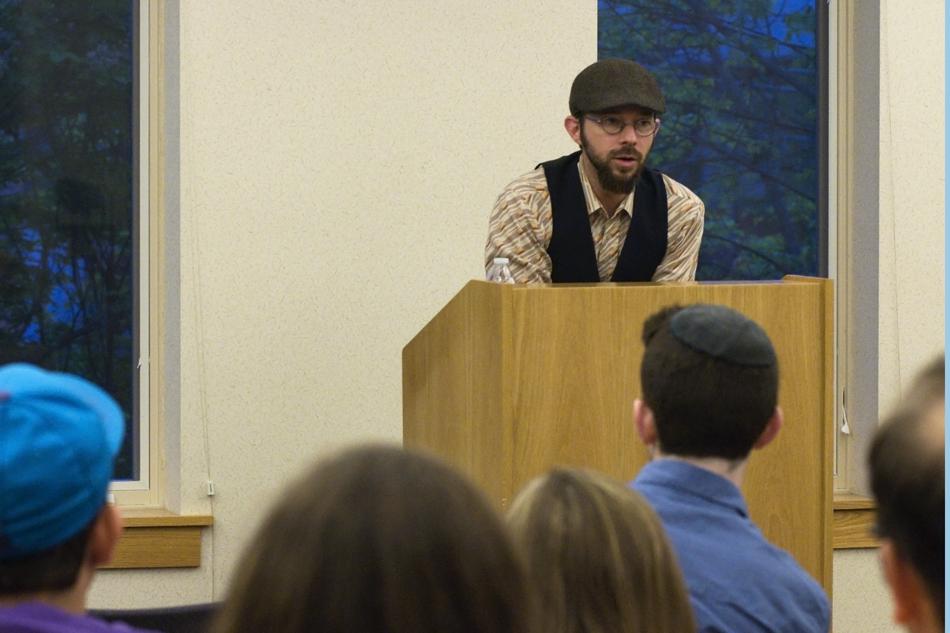Hillel director, memoir author discuss aftermath of 2002 bombing
Jordan Harrison/Daily Senior Staffer
Author David Harris-Gershon speaks about how he was affected by a 2002 bombing at the Hebrew University of Jerusalem. Harris-Gershon and Fiedler Hillel Center director Michael Simon spoke at Hillel about their experiences following the bombing in an event co-sponsored by the Office of Religious Life and the Creative Writing Program.
May 21, 2014
Fiedler Hillel Center director Michael Simon and author David Harris-Gershon spoke to about 60 people Tuesday about their contrasting experiences following a 2002 bombing at The Hebrew University of Jerusalem.
Harris-Gershon’s wife, Jamie Harris-Gershon, was injured by a piece of shrapnel from a bomb set by a Hamas terrorist in the university cafeteria. She survived, but in the aftermath, David Harris-Gershon said he needed to find closure for the traumatic experience and decided to try to contact the bomber, Mohammad Odeh, and his family. He recently published a memoir “What Do You Buy the Children of the Terrorist Who Tried to Kill Your Wife?”
Harris-Gershon said he was never able to meet Odeh, who publicly expressed remorse after the bombing, but he met with Odeh’s family and his two children.
“I brought them gifts,” Harris-Gershon said. “I brought a stencil set for the young girl and a Rubik’s cube for the older boy and they kind of came up to me, very sweetly — the guy was in a Chicago Bulls sweatshirt and the girl was wearing Hello Kitty. They just looked like they would be my kid’s friends or my students.”
Harris-Gershon said after meeting with the family for the first time, he had conflicting emotions.
“(The children) took the toys and they were just beautiful and they walked away and Mohammad’s grandmother said to them to explain to them who I was, ‘This is your father’s friend,’” he said. “I remember looking at them thinking, ‘I am not your father’s friend,’ and I also remember thinking that they were beautiful, and that in another context that possibility existed.”
Simon had a very different experience with the bombing. Marla Bennett, his girlfriend at the time, died in the explosion. Simon said, in contrast to Harris-Gershon, that his faith deepened after the experience. He illustrated his thoughts on prayer with a different story about a family responding to the death of their son, an Israeli soldier.
“The father’s answer was, ‘We pray to God, sometimes the answer is no,’” Simon said. “That answer, which was of course my answer, was in my heart and mind and soul as I dealt with trying to figure it out, and I continue to pray and I continue to believe.”
Through his journey, Harris-Gershon said, his viewpoint on the conflict between Israel and Palestine shifted dramatically, noting he thought Northwestern students had a more mature understanding of the issue than he had growing up.
“I viewed myself as a typical American Jew at that stage,” he said. “I really viewed Palestinians at that point as nothing but a caricature of evil, as just one in a series of enemies who throughout history have risen up to destroy us, and this was just the latest iteration. That’s how naive I was, and that’s how uninformed I was, and what happened is that I began a quest to meet Mohammad.”
The event was co-sponsored by the Office of Religious Life and the Creative Writing Program, which Simon said was partly to attract interest in the event from outside the Jewish community at NU.
In a question-and-answeer session following the event, attendees asked the two friends how their relationship with Israel and their Jewish faith changed after the bombing and to what extent politics should be a part of Jewish education.
SESP sophomore Jacqueline Soria said she was taking a seminar with Simon about the relationship between Jewish faith and the politics of Israel, and said the themes of the talk related well to the course.
“I thought that this event where (Simon) brought in his friend, this person in his life who he’s tied to through a really unfortunate event, and showing how they both took different paths, how they both interpret it in different ways and are coping with it in different ways, I thought that that was a really meaningful example of how we can have conversations even if we don’t see things the same way,” she said.
Email: [email protected]
Twitter: @MedillJordan


